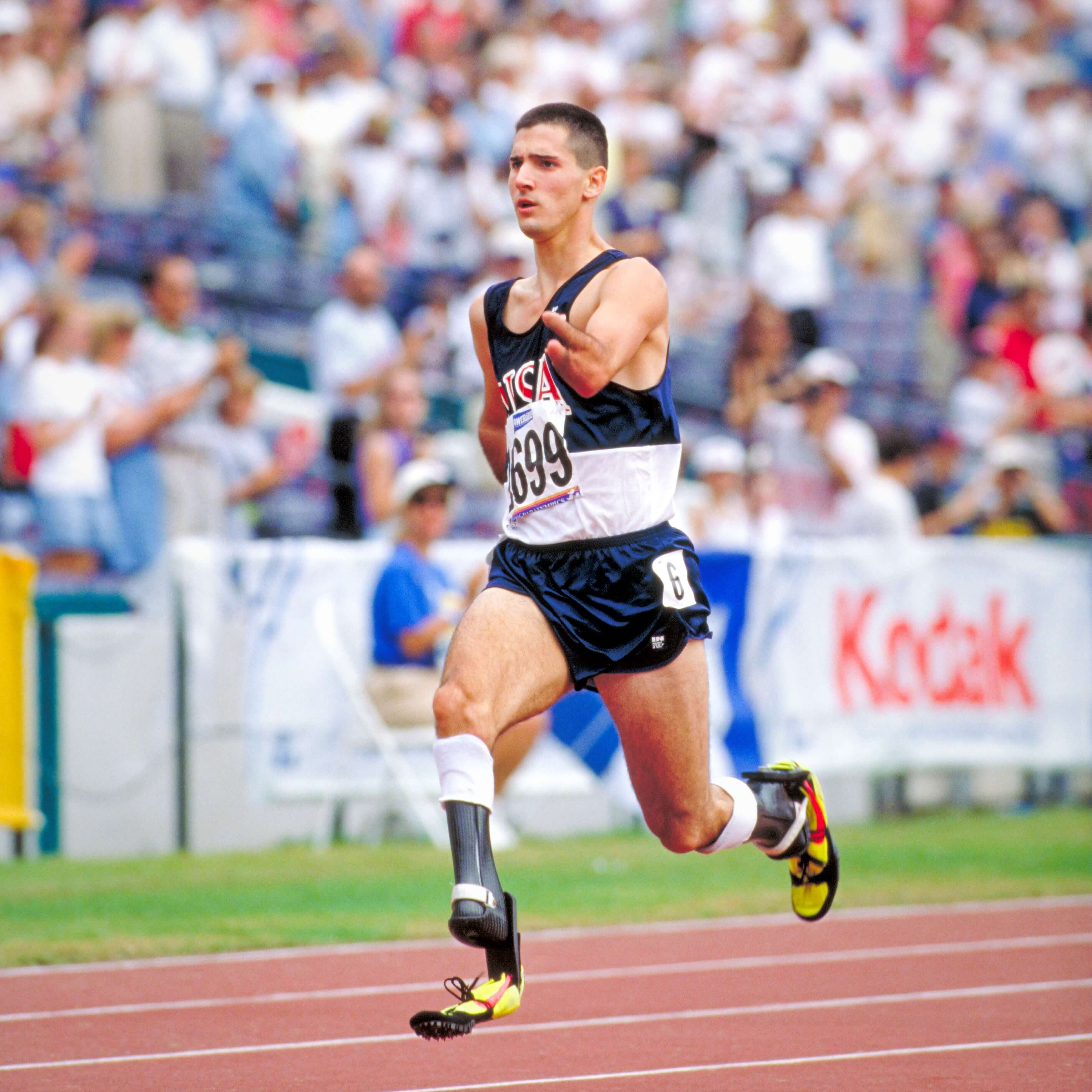This story was originally featured on our Main Street Stories blog. Follow the link to see more content like this: https://www.aboutschwab.com/stories
We’ve all entertained the idea of who would play us in the movie adaptation of our life. And while for most of us it's a fun fantasy, for Schwabbie Tony V., it's a real-life discussion he’s currently having with movie executives who plan to produce the story of his amazing life.
Tony lives by the motto "If you can dream it, you can achieve it." Born without hands or feet, Tony was told that he'd have to rely on his brain to make a successful life. However, not one to be held back, Tony dared to achieve his dream of becoming an elite runner and Olympic champion.
SEEKING A PLACE TO BELONG
After having spent his early education at a small Catholic school, Tony struggled with the transition to a large public high school. There was the general awkwardness of being a teenager, compounded by the fact that he was the new guy, not to mention that he had physical disabilities that caused kids to stare. He needed a way to meet people.
“Nobody got cut from the track team,” explains Tony regarding his decision to take up athletics. “So, I decided to join, and I stuck with it.”
Tony came in last every single race. Without prosthetics he had a three-inch difference in the length of his legs, which caused him to run with a kind of gallop. He explains that it was like trying to run on his heels, and that it was very, very slow.
“But I didn’t care,” explains Tony of that time. “I was having so much fun meeting people. And I’m glad I stuck with it long enough for the technology to become available.”
FROM LAST PLACE TO THE OLYMPICS
The technology Tony is referring to is the development of a prosthetic made of carbon fiber that is sometimes referred to as a “blade.” While there are many models available now, the blade was first developed in the mid ’80s, and Tony received a pair his junior year of high school.
“All of a sudden, I saw my times start to drop,” explains Tony regarding the impact on his racing. “By the time I got to my senior year, I still never won a race, but I got second and third a lot. And I found out my times were not far off the Paralympic world records.”
So, Tony found a coach and pursued a dream of becoming a professional athlete. In 1990, at the age of 17, Tony entered the international racing scene when he won three gold medals at the World Championships for the Disabled in St. Etienne, France.
Tony then went on to set two world records and win two golds and a silver medal at the 1992 Paralympic Games in Barcelona. He backed these wins up at the 1996 Paralympics in Atlanta, with two more golds plus another world record in the 100 meters.
“I was always told I would have to rely solely on my brain to achieve success,” says Tony. “But I had a different dream, and I became a full-time paid athlete.”
A CULTURE OF SUPPORT
After over a decade as an athlete, Tony decided to listen to his body and start to slow down. He’d always enjoyed tinkering with technology, which led him to a contractor position at Schwab, where he helped the company prepare for Y2K. Next, he took a few other contract roles with Schwab before he found a permanent position in 2007; he’s been here ever since.
“The culture is what keeps me here,” explains Tony, who is currently working as a systems engineer with Schwab Technology Services. “Schwab is very arms open when it comes to acceptance and support.”
In fact, Schwab was recently awarded with a 100% rating on the 2022 Disability Equality Index (DEI), the third year in a row, giving the company the distinction of being recognized as a “Best Place to Work for Disability Inclusion.”
“I want people to know that they don’t have to be afraid to ask questions of people with disabilities,” explains Tony on the topic of disability inclusion. “Ask questions; don’t make assumptions. And maybe hold the door open if you see me coming.”
IF YOU CAN DREAM IT, YOU CAN ACHIEVE IT
Tony believes that the mindset of “If you can dream it, you can achieve it” is the lasting legacy of his athletic career.
“The concept of putting your energy out into the universe and then making the decisions to drive you down that path didn’t exist in the ’90s,” explains Tony. “But I believed in it early, and it’s this mindset that has driven me way past my athletics into my personal life with my family and my career and my future.”
While Tony’s looking forward to seeing the future feature film portraying his life, he’s more focused on visualizing his next dream.
“Well, I would like to retire someday,” explains Tony.
(0822-20UH)


